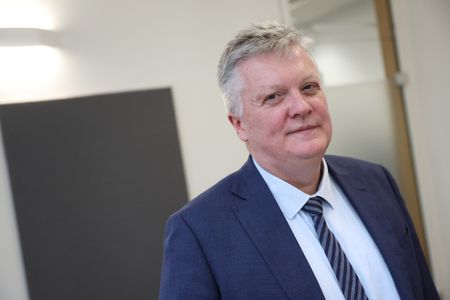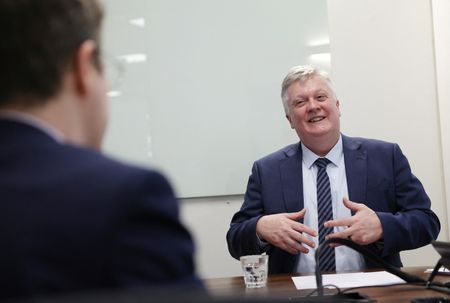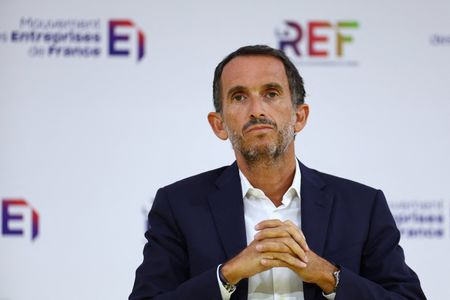By William Schomberg and David Milliken
LONDON (Reuters) – The Bank of England needs to move cautiously with cutting interest rates because the long process of wrestling down inflation is not yet complete, BoE Chief Economist Huw Pill told Reuters.
A week after the central bank cut rates for only the third time since raising them to a 14-year high in 2023, Pill said the big picture was one of inflation falling towards the BoE’s 2% target.
However, underlying price pressures remain, Pill said in an interview on Wednesday, explaining his call for caution on further reductions in borrowing costs even as Britain’s economy is struggling to grow.
“We are able to remove some of the restriction we imposed because of the successful – but not yet complete – process of disinflation,” he said.
But the BoE had more work to do to bring down inflation “and that means we can’t just remove all restriction overnight, cut rates aggressively, etc, etc,” he said.
The former Goldman Sachs economist joined the BoE in September 2021, just as inflation in Britain – and many other rich economies – was starting a surge that forced central banks around the world to raise rates to their highest in decades.
CAUTIOUS OR CAREFUL?
After peaking at 11.1% in 2022 – a four-decade high driven largely by the leap in gas prices after Russia’s invasion of Ukraine – inflation in Britain has fallen back.
But it remains above target at 2.5% and the BoE expects it to pick up to 3.7% later this year, albeit due to temporary factors. Inflation is not forecast to return to target until late 2027.
The BoE last week maintained its “gradual” description of the outlook for rate cuts and said some policymakers also wanted to add the word “cautious” due to weak productivity that could push up inflation.
Others on the Monetary Policy Committee preferred the term “careful” which was adopted in its guidance on borrowing costs.
Pill said he had argued since last year that the BoE needed to be cautious about easing policy – he voted against the first cut last August – and the “cautious-careful” debate reflected ongoing differences on the MPC about timing of future moves.
“I would expect we’re going to cut Bank Rate further. But the pace at which you can do it is less,” he said. “And I think that’s what’s being indicated by the words ‘cautious and gradual’, as opposed to ‘gradual and careful’.”
A bigger MPC divide has opened up about the cause of the weakness in Britain’s economy. The central bank halved its growth forecast for 2025 to 0.75% last week, a blow for finance minister Rachel Reeves who has been criticised by employers for raising taxes on them.
While seven MPC members backed the quarter-point cut to the BoE’s benchmark Bank Rate last week, the other two called for a bigger half-point cut, arguing that a slump in demand was behind the flat-lining of output in much of 2024.
Pill said he believed the main problem was one of supply – reflecting long-term inflationary trends in the economy ranging from a shortage of workers and weak business investment to the impacts of Brexit, energy prices and the pandemic – which would not be solved by stimulating demand with sharp rate cuts.
However, there were signs of a hiring slowdown which would reduce the risks of this year’s expected inflation jump leading to inflationary wage demands.
That contrasts with the last time the BoE forecast a modest pick-up in inflation in mid-2021, when the country’s tight labour market was amplified by the huge impact on energy prices caused by the war in Ukraine in 2022.
“The environment in which this hump in inflation takes place, in terms of whether it’s susceptible to second-round effects or not, is probably less of concern, relatively speaking at least,” Pill said.
However, data on wages was not completely reassuring. Employers surveyed by the BoE expect to raise wages by an average of 3.7% this year – down from 5.3% in 2024 but higher than Pill thinks is compatible with 2% inflation.
“3.7% I’m not sure is job done,” he said, adding it was at the top end of a 2-4% range employers had suggested was likely a few months ago.
Asked about U.S. import tariffs proposed by U.S. President Donald Trump on trade partners, Pill said they would not automatically lead to higher inflation but could have “quite substantial effects”, especially in the longer term.
“If the disruptions to the international trading system weigh on global trend growth or UK potential growth – both of which seem plausible to me – they create a … difficult trade-off for monetary policy where activity can remain quite sluggish and yet price pressures remain in the system,” Pill said.
(Writing by William Schomberg and David Milliken)









